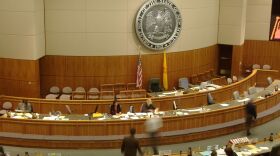New Mexico's House Taxation and Revenue committee has been hearing tax proposals for 48 days and on Monday passed a bill that compiles around 20 of them into a comprehensive package. It includes a significant reduction of direct payments called for by Gov. Michelle Lujan Grisham in order to make room for other reforms.
The state budget proposal allows for about $1.1 billion in tax breaks. Tax and Revenue Committee Chair Rep. Derrick Lente (D-Sandia Pueblo) who sponsored the omnibus tax bill said issuing rebates at the level proposed — $750 for single filers and $1500 for married couples — would have cost nearly that same amount.
“Which would have eaten up completely our capacity to do anything creative with our tax package," he said. "Meaning that we would have just sat here to look at legislation not being able to do anything.”
The package of tax legislation instead includes smaller $300 rebates for individuals and $600 for joint filers, leaving about half of the state’s tax reduction budget to go to other things that Lente said “will have generational impacts on our state.”
The bill as proposed uses most of that capacity, with a more than $959 million price tag.
It spends that on, among other things, reforming the state’s income tax brackets. It lowers the rate for New Mexicans with low- and middle-incomes while raising it for the state’s top earners. It also reduces the gross receipts tax by half a percentage point on top of last year’s quarter of a percent, which Speaker of the House Javier Martinez (D-Albuquerque) called “huge.”
“It’s a small number but it’s a lot of money,” he said. “We have been able to do something that was unthinkable even a few years ago. And that is to reduce arguably the most regressive part of the tax code.”
The package, however, does not include anti-pyramiding legislation that would have prevented some products and services from being subject to the gross receipts tax multiple times. The governor had called for enacting what she called the "common sense" legislation in her state of the state address, but Lente said the committee was unable to come to a compromise to protect the GRT revenue of local governments.
“Maybe next time around we can drop some of those off,” Lente told Rep. Jason Harper (R-Rio Rancho), who expressed disappointment that the legislation he’d advocated for didn’t make it in.
Additionally, the package increases the state child tax credit while reducing the deduction on capital gains. It also raises taxes on alcohol and tobacco products.
The committee passed the bill on a 9-5 party-line vote, with most members complimenting its sponsor for inclusivity and balance through compromise, including Rep. Harper, who voted no.
“A good tax reform measure you usually like about 70-ish percent of it and hate the other 30%,” he said. “And, depending on where you sit, what you like and hate is different. And so, I think there’s a lot of things in this legislation that we can be happy with.”
He went on to express support for the allocation of the liquor excise tax to addiction treatment, the tax credit for rural healthcare providers, and a compromise he said he reached with Rep. Christine Chandler (D-Los Alamos) over a more modest reduction of the capital gains deduction.
The tax bill is often unveiled in the final days of the session. Speaker Martínez told his fellow lawmakers on the Tax and Revenue committee that doing so with two weeks left, and on a Monday morning no less, helps increase transparency around what’s included in it and ensures it gets a proper vetting.






